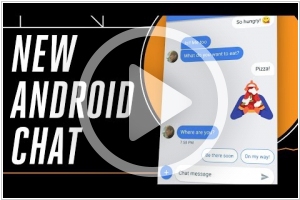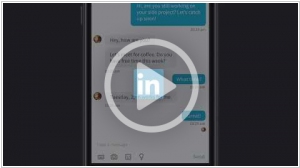Top 10: Business messengers
Updated: August 16, 2023
Business messengers have revolutionized the way companies communicate, offering efficient and secure platforms for real-time interactions. These dedicated messaging applications, tailored for professional use, facilitate seamless collaboration among teams, partners, and clients. With features such as instant messaging, file sharing, video conferencing, and integrations with other business tools, these messengers streamline workflows, enhance productivity, and enable effective remote work. Their focus on data privacy and encryption ensures confidential information remains protected, making them indispensable tools for modern enterprises seeking to foster effective communication and maintain a competitive edge in today's fast-paced business landscape.
Some of the most popular business messengers are listed below.
See also: Top 10 Business Messaging platforms
See also: Top 10 Business Messaging platforms
2023. LeapXpert raises $22M to monitor employee chats for compliance
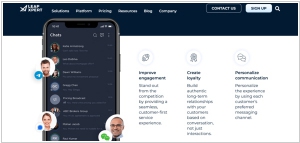
LeapXpert, an instant messaging software that allows employees to message customers or colleagues through popular apps, including WhatsApp, WeChat, iMessage, Telegram and Signal, while monitoring and archiving their business-related chats, has raises $22M. LeapXpert touts its worker-monitoring, “mobile-first” dashboard through which employees can sign in to and access chat channels such as SMS, iMessage, WhatsApp, Telegram, WeChat, Signal, Line and certain VoIP apps. On the employer side, companies can set rules and requirements for the types and level of materials that can be sent internally or externally, including specific keywords and phrases, and see the real-time status of all messages sent. LeapXpert promises to avoid capturing private and personal messages by siloing communications, enabling employees to have an independent messaging profile for personal use.
2019. BlackBerry Messenger was discontinued (for consumers)
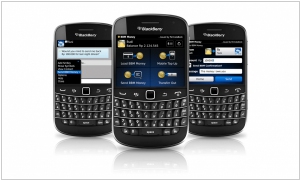
Indonesian media company Emtek, which acquired BlackBerry Messenger in 2016, has declared the discontinuation of BBM. Initially launched in 2005, BBM held a strong position as BlackBerry's flagship product for many years, with dedicated users who remained loyal to the platform even as Android and iOS devices gained popularity. However, increasing competition eventually overshadowed BBM, causing it to lose relevance in the rapidly evolving world of technology. Consequently, the rewards derived from BBM no longer justified the resources invested in its maintenance. It is worth noting that the secure enterprise service, BBM Enterprise, will continue to be available for business users.
2019. WhatsApp Business app added customer service features to its desktop and web apps
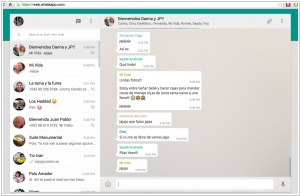
About a year ago, WhatsApp launched its dedicated app tailored for small businesses. Now, the company is enhancing the usability of the app on desktop and web platforms by incorporating several popular features that were previously exclusive to mobile devices. These additions encompass tools for organizing and filtering chats, as well as facilitating prompt responses to customer inquiries. One such feature is Quick Replies, which enables businesses to swiftly address common customer questions using pre-written responses. It joins a suite of other customer service features, including automated greeting messages triggered when a customer contacts the business account, and scheduled away messages for instances when immediate responses are not feasible.
2018. Yahoo Messenger is shutting down
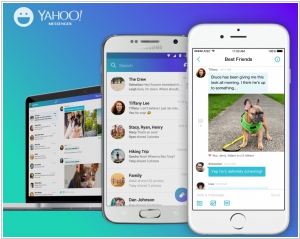
Yahoo Messenger, one of the pioneering instant messengers, is scheduled to cease its service on July 17. While the company has not explicitly stated the reasons behind this decision, it comes as no surprise considering the current dominance of messaging platforms such as Facebook's WhatsApp and Messenger, Snapchat, WeChat, and others. It is worth noting that Oath, the parent company, previously discontinued AIM, AOL's equivalent messaging application, in October. Yahoo has provided an option for users to download their chat history on Messenger for the next six months, which can be done by visiting this link. The downloaded files will be saved to your computer or device, but there is no specific provision to transfer them to another messaging app.
2018. Google unveils new messenger Chat
Google is introducing a new messaging service called Chat, designed to enhance the messaging experience on Android. Chat, an acronym for "Rich Communication Service" (RCS), represents Google's latest and most ambitious effort to simplify messaging. The goal is to encourage adoption of this technology by carriers and smartphone manufacturers. By embracing Chat, users will benefit from various improvements, including read receipts, real-time typing indicators, high-quality images and videos, and group messaging capabilities. It's worth noting, however, that Chat does not provide end-to-end encryption, which means that messages can be legally intercepted. Currently, 55 carriers, 11 manufacturers, and two operating system creators (Google and Microsoft) have pledged their support for Chat.
2018. Telegram’s new widget lets businesses connect with users
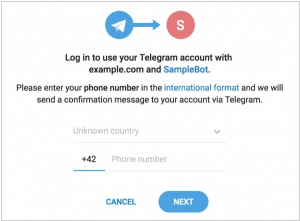
Messaging app Telegram has introduced a new web login widget feature. This functionality enables website owners, particularly business owners, to establish a direct connection with Telegram users through a Telegram bot integrated into their site. By combining the bot with the web plugin, businesses can leverage this system to send reminders, sales confirmations, updates, and other relevant information directly to customers via chat. It's worth noting that Facebook launched a similar plugin last year, enabling businesses to connect with users through Messenger. Additionally, Facebook is developing business-focused applications that allow companies to tap into its vast monthly userbase of 1.5 billion, with upcoming payment features on the horizon as well.
2017. Facebook Messenger adds plugin for business websites
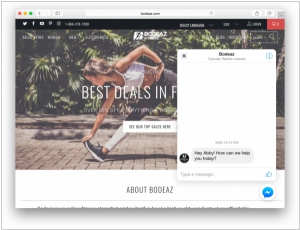
The Facebook Messenger is now expanding its reach to business websites with a new plugin. This innovative plugin enables customers to directly engage with businesses on their websites using Messenger, and seamlessly continue those conversations across various devices such as web, mobile, and tablets. By leveraging Messenger, businesses not only make themselves available on a platform with a staggering user base of approximately 1.2 billion monthly users, but they also gain access to a range of powerful features. These features include payment capabilities, natural language understanding chatbots, and support for rich media content, among other functionalities. Similar to other web chat systems, the Messenger chat plugin appears as a hovering element atop the business's web page and is easily identifiable by the familiar blue Messenger icon.
2017. LinkedIn makes its messenger smarter
LinkedIn is introducing a new smart reply capability within its messaging app, designed to assist users in maintaining a smooth conversation by offering various suggested phrases. The initial release of this feature is available in English on LinkedIn's mobile app and desktop platform. The company intends to expand its availability to other languages in the future. Users have the option to disable the smart reply feature through their settings. While LinkedIn has been experimenting with suggested replies since January, today's announcement signifies a significant advancement as the company incorporates more AI tools, including machine learning and enhanced natural language processing, to better comprehend conversation context and provide helpful suggestions.

